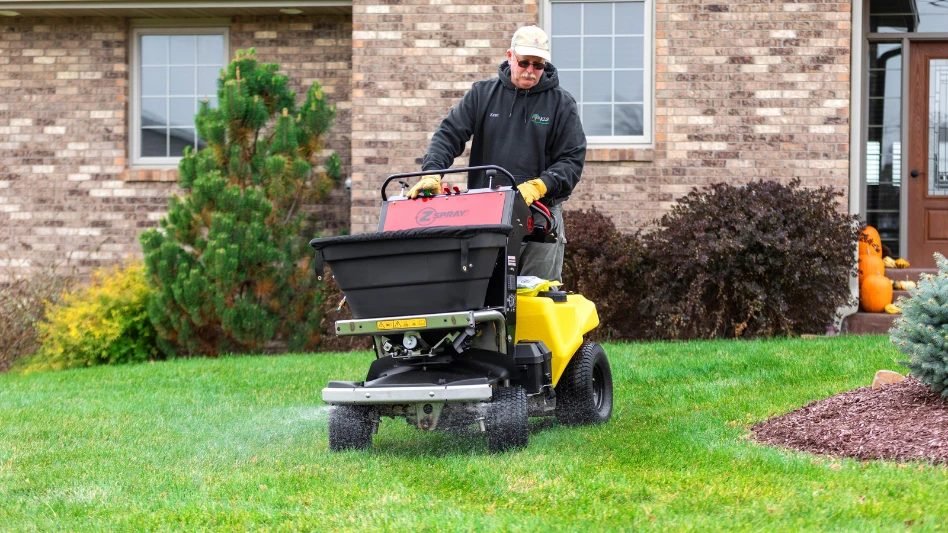Tourist Killed in Beijing was a Green Industry Veteran
News of Todd Bachman’s death was a devastating way to start the Olympic games. It was even more devastating for family and members of the green industry in which he was so involved.
Todd, 62, was CEO of Bachman’s, a Minneapolis-based company that operates floral and garden centers and landscaping divisions. The father of a former Olympic volleyball player (Elisabeth Bachman McCutcheon, wife of current U.S. men’s Olympic volleyball coach, Hugh McCutcheon), he was in Beijing for the games with this wife, Barbara, when both were stabbed in August in a random act of violence. He died and Barbara was injured.
“All of us who have had the privilege of knowing Todd Bachman are devastated by his loss,” said Bob Fitch, executive director of the Minnesota Nursery & Landscape Association, in a letter to members. “Todd was a caring and generous person.”
Todd was instrumental in establishing the non-profit MNLA Foundation, which works to improve the outdoor living environment by investing in research and education, Fitch added.
“Todd was a great thinker but such an ordinary guy,” said his friend, George Lucht of Malmborg, a Rogers, Minn.-based grower, who is still trying to come to grips with the tragedy. “He was so comfortable to be with and so bright.”
Lucht and his wife spent much time with the Bachmans and two other couples. They attended the Bachmans’ daughters’ weddings. Bachman’s is also one of Malmborg’s largest wholesale customers.
Todd was just a couple years away from retiring and was looking forward to spending more time at his Naples, Fla., home, Lucht added.
Todd had leadership positions in several other organizations including the Society of American Florists, the Minnesota Commercial Flower Growers Association, the North Central Florists Association and the Widmer Research & Education Fund. He also served on the board of Hortica Insurance Company and Yoder Brothers.
Water Feature Industry Voices Concerns Over EPA Proposal
Representatives of the IPPCA Legislative Action Team (LAT) Executive Director Dave Jones and Director of External Affairs Freddie Combas, were in Washington, D.C. Aug. 14. The purpose of this trip was to meet with other Green Industry Coalition (GIC) representatives in an informal face-to-face meeting with the EPA.
The meeting was hosted by Andy Smith, external affairs officer of the Irrigation Association (IA). The GIC has a multitude of concerns over language in the landscaping section of the newly proposed EPA Water Sense New Home Specifications Program that is poised to be launched before the end of the year.
The current EPA language has drastic restrictions on turf, landscape amenities and irrigation, as well as a total ban on ornamental water features, which could have adverse short- and long-term effects to the multi-billion dollar green industry and to the environment. The IPPCA LAT led in the formation of a pond and waterscape industry coalition that includes major businesses, associations, manufacturers and hobbyists involved in the pond and waterscape industry. The IPPCA LAT diligently worked to create new language for the EPA that would be more favorable and acceptable to the pond and waterscape industry. In less than 24 hours the newly proposed language was signed and endorsed by more than 145 concerned entities.
“When I heard that the IPPCA was attending this meeting, I felt that it was the least we could do as a major manufacturer of Pond and Waterscape equipment to assist those that are out there aggressively protecting our industry and interests,” says Jeff Weemhoff, president of Atlantic Water Gardens.
All of the GIC concerns were presented to the EPA, along with a host of scientific test data and possible alternate solutions. One of the solutions of the many that were presented was the need for proper education on efficient water use as it pertains to the outdoor landscape. Efficient water use by the homeowner and proper water efficient landscape design, amenity choices and qualified installation by the contractor(s) were the primary focus.
The GIC opposes the approach taken by the current language in the specifications of the proposed program. Freddie Combas presented the IPPCA and Pond and Waterscape Industry Coalition’s opposition to the total ban of Ornamental Water Features saying, “This action represents a total reversal to past EPA actions, grants, programs and recommendations to the general public promoting ponds, waterfalls, streams, and eco-friendly site practices.”
The EPA acknowledged that the language as it pertained to ornamental water features was too broad and that clarification was needed.
The IPPCA LAT had alternate proposed language for the ornamental water features section (4.1.4) that was prepared and ready to be presented to the EPA at this meeting. The GIC determined that the Pond and Waterscape Industry Coalition alternate language would have a more favorable impact if presented with the total package that will be submitted to the EPA by the GIC later this month.
The IPPCA was met with favor when its LAT representatives renewed the IPPCA’s offer of assistance to the EPA in the revision of Ornamental Water Features 4.1.4.
“The Ornamental Water Feature is often an integral part of the comprehensive landscape and these water features can be quite water efficient,” says IA External Affairs Officer Andy Smith. “It is important for the industry and EPA to find ways to reward efficient water use rather than penalize an entire sector of the GREEN Industry for an inaccurate perception. The IPPCA has been highly successful, I feel, in getting that message across loud and clear in a positive fashion to the EPA.”
Five Ways to Stop Fraud
Small businesses that employ less than 100 workers, such as many landscape firms, are highly susceptible to incidents of fraud, according to a recent study.
Among the fraud cases detailed in a study conducted by the Association of Certified Fraud Examiners, the median loss suffered by small business was roughly $200,000.
In addition, the ACFE study found that check tampering and fraudulent billing were the most common of all small business fraud schemes.
To combat potentially costly fraud losses, the ACFE offers the following tips:
Be proactive. Establish and maintain internal controls specifically designed to prevent and detect fraud. Adopt a code of ethics for management and employees. Set a tone at the top that the company will not tolerate unethical behavior.
Establish hiring procedures. When hiring staff conduct thorough background investigations. Check educational, credit and employment history, as well as references.
Training. Ensure that staff members know at least some basic fraud prevention techniques. Are employees aware of procedures for reporting suspicious activity by customers or coworkers? Do workers know the warning signs of fraud?
Conduct audits. High risk areas, such as financial or inventory departments, are obvious targets for routine audits. Surprise audits of those and all part of the business are crucial.
Consult an expert. If fraud is suspected, consult an anti-fraud expert to assess the situation.
PGMS Announces School of Grounds Management Lineup
In an effort to help the green industry meet the surging demand for sustainable grounds maintenance practices, the Professional Grounds Management Society (PGMS) has announced its faculty and curriculum for the 2008 School of Grounds Management. The event is scheduled to take place Oct. 22-25 at the Kentucky Exposition Center in Louisville, Ky.
She said courses will cover the following topics related to green practices: sustainable maintenance of perennials and shrubs, using LEED guidelines to manage landscapes, managing green roofs, preserving trees and the latest information from the Sustainable Sites Initiative.
Even with a heavy emphasis on green practices, the School of Grounds Management will also provide attendees with an outstanding multidisciplinary education schedule including the following course titles: Taking the Mystery Out of Managing and Motivating Employees, Leading Change from the Front Line, Project Management for “Accidental” Project Managers, Building a Customer Service Culture, and Effective Management of Snow and Ice Sidewalk Crews.
“With a faculty of green industry experts and a wide offering of courses ranging from LEED and conservation issues to management to horticulture, the School offers grounds superintendents and landscaping professionals a great opportunity to further their professional development,” said Higgins.
There will also be interactive education opportunities in the field with behind-the-scenes tours of the grounds operations of Louisville’s Department of Parks and Recreation and Churchill Downs, home of the Kentucky Derby.
The School is targeted at in-house grounds managers overseeing an assortment of facilities ranging from universities to commercial facilities to municipalities, but the range of topics covered makes it relevant to all green industry professionals. In addition to this curriculum, tuition also includes free admission to the GIE+EXPO, providing attendees with full access to exhibits from 650 green industry suppliers as well as a 20-acre outdoor demonstration area adjacent to the indoor exhibit.
The program will also offer networking opportunities with more than 25,000 industry professionals in attendance as well as an opportunity to relax and enjoy free concerts featuring performances by .38 Special and Lonestar. Considered the premiere educational event for grounds management professionals, this year’s School of Grounds Management also includes Educational Breakfast programs, and other social and educational opportunities.
At the conclusion of the program on the evening of Oct. 25, PGMS will announce its 2008 Green Star Award recipients. The Green Star Awards program complements other national landscape award programs that recognize outstanding landscape design and construction by saluting the grounds superintendent and staff responsible for maintaining a well-manicured landscape year round.
Sites will be honored in 15 categories: small sites; residential landscapes; public works sites; shopping areas; hospitals or institutions; government buildings or complexes; cemeteries or memorial parks; industrial, commercial sites or office parks; parks, recreation areas or playgrounds; multiple sites under management companies; condominium or apartment complexes; hotel, motel or resorts; amusement parks, theme parks or zoos; athletic fields, professional fields or golf courses; and school grounds, university and college grounds, or urban university grounds.
The PGMS will also offer attendees the opportunity to take the Certified Grounds Manager (CGM) exam. Developed and offered by PGMS, it is the premiere program of its type in the green industry. With CGM certification, your presentations, requests for funds and equipment and recommendations carry more weight. PGMS will be offering a reduced $100 testing fee for all of those who are prequalified for the CGM exam by Oct. 1 and registered for the PGMS School of Grounds Management. For further information on the CGM program, visit PGMS online at www.pgms.org/cgmcertification.htm.
USCIS Suggests Changes for H-2B Program
New rules have been proposed that are designed to remove “unnecessary limitations” and improve temporary workers’ rights. The United States Citizenship and Immigration Services (USCIS) announced a series of proposed rule changes that would streamline procedures for hiring foreign workers under the H-2B program.
The proposed rule changes would:
- Reduce the time H-2B workers must wait outside the U.S. at the end of their visa’s validity before they are eligible to re-apply under an H or L class visa from six months to three months
- Require employers to give a detailed description of the H-2B employment and outline their use of recruiters to locate H-2B workers
- Punish employers and recruiters who require payment from prospective H-2B workers in connection with or as a condition of an offer of H-2B employmeny
- Prevent, with limited exception, the change of the employment start date after the grant of the temporary labor certification
- Require employers to notify the Department of Homeland Security when H-2B workers fail to show up for work, are terminated, or leave the worksite without notification
- Change the definition of “temporary employment” to provide that a job is of a temporary nature when the worker will end in the near, definable future
- Eliminate the requirement that employers show “extraordinary circumstances” to be eligible to hire H-2B workers where a one-time need for the workers is longer than one year but shorter than three years
- Prohibit the approval of H-2B petitions for nationals of countries that consistently refuse or unreasonably delay repatriation of their citizens
- Establish a “land-border exit system” test program, which requires temporary workers admitted through a port of entry participating in the test program to also depart through a participating port and to present designated biographic and/or biometric information upon departure
The proposal came two weeks after the USCIS announced that the H-2B cap was met for the first half of the 2009 fiscal year.

Explore the September 2008 Issue
Check out more from this issue and find your next story to read.
Latest from Lawn & Landscape
- PERC helps debut propane direct-injection fuel system at ACT Expo 2025
- Retargeting Ads – A Secret Weapon for Growing Your Lawn Care Business
- Leading a growing company
- Project EverGreen launches Clean Air Calculator
- Rain Bird acquires smart lawn care company OtO from Toronto
- PBI-Gordon names Marvin as VP of research and development
- Mean Green rolls out Vanquish Autonomous mower
- Focal Pointe launches new podcast series





